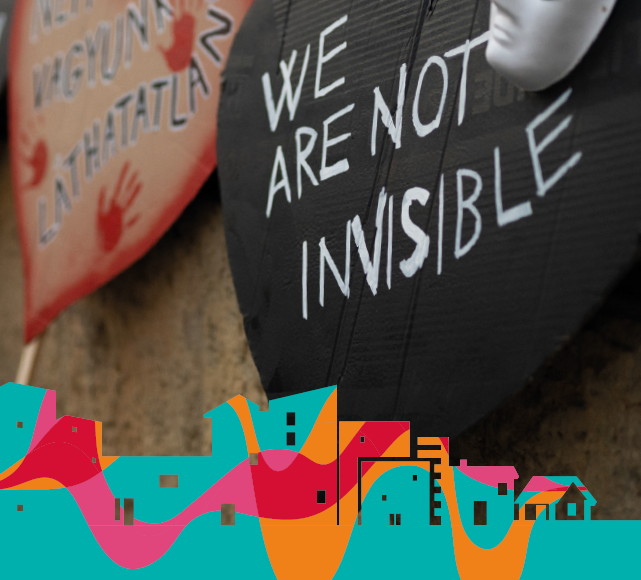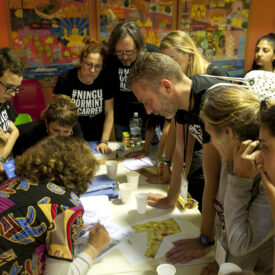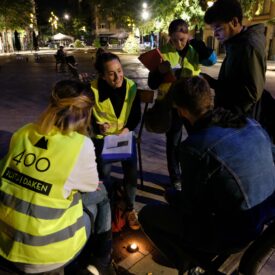“The problem of homelessness is not just a local problem. It’s a national problem, it’s a European problem, it’s a global problem.”
Adrienne Van Vyve, Project Manager at Infirmiers De Rue / 400 Toits (Brussels Campaign)
The World Habitat Awards – organised in partnership with UN-Habitat – recognise and highlight innovative, outstanding and sometimes revolutionary housing solutions from across the world. In 2013 and 2014 the 100,000 Homes Campaign in the USA, and the Y-Foundation in Finland, won Awards for their approaches to tackling homelessness. Inspired by these, the following year in 2015, we initiated the European End Street Homelessness Campaign which brought together key approaches of both of these winners.
By Patrick Duce, Campaign Impact Manager (European End Street Homelessness Campaign) at World Habitat
Today, we’ve published our first Impact Report, which outlines the successes and challenges of co-ordinating a network of individual campaigns to end street homelessness. It tells the story of the campaign, explains our model, why we believe communities are part of the solution and what we’re trying to achieve.
With the right level of commitment from all stakeholders, significant reductions in street homelessness can be achieved. How do we know this? Because this campaign’s model is inspired by those who’ve successfully reduced, or practically ended, street homelessness. That meant, before anything else, we needed to properly understand who’s ‘rough sleeping’ in a local area. This includes taking the time to involve local residents and ensure that people experiencing homelessness can fully share their stories, know they’re being taken seriously, and can say what they need and want. Public awareness, understanding and most importantly compassion is activated by participation and human relationships.
“To think that we are in Barcelona, a city so beautiful, so rich, so full and what it has are many people in absolute poverty surrounded by wealth. Seeing it with your own eyes is still a pain inside that touches the part of our local social consciousness. We are no longer talking about world inequality but of people living outside our front door.”
Anna, volunteer with the Barcelona Campaign
Over the past three years we’ve trained and supported almost 3,000 community volunteers to work in partnership with local homelessness organisations to deliver a range of data-led activities that has challenged local policy makers to respond. These lay the groundwork to start making challenging but essential steps towards providing solutions – such as Housing First – that provide unconditional access to housing with the right level of support. By the end of last year, our campaign had moved 344 people into permanent accommodation (not night shelters, assessment spaces or temporary accommodation), and created 163 independent Housing First units.
Most importantly, our campaign has taught us that challenging the status quo and embedding new practices requires both time, leadership and, above all else, a willingness from key stakeholders to act together. Without this, we’ll continue to just manage homelessness and not end it for good. Our Torbay campaign in the UK produced a feasibility study – funded by the Nationwide Foundation – which led the local authority to commit £500,000 for their first ever Housing First project.
“We have moved beyond saying that in Scotland we believe Housing First creates the best base for recovery, to saying that it will be our default offer to people experiencing homelessness and a range of other multiple needs.”
Claire Frew, Policy and Impact Manager at Glasgow Homelessness Network (Glasgow Campaign)
In Barcelona they’ve consistently mobilised hundreds of volunteers to map the scale and nature of rough sleeping in the city, having a profound impact on how homelessness is now measured and responded to by the local municipality. In Bratislava, we see the real challenges that services face because there’s no formal definition of homelessness in Slovakian law.
It’s important to recognise however, that street homelessness continues to grow in most European cities, and as Campaign Impact Manager covering 12 cities across Europe, I see evidence from across the campaigns that shows me there’s still so much more to be achieved.
“One may need shelter from the storm but you need a home to lead a decent life. Ending homelessness is not a utopian ideology. It’s a question of human rights and saving lives.”
Juha Kaakinen, CEO of Y-Foundation, Finland
We’ve built up a body of practical resources, from cities such as Brussels, Barcelona, Croydon, Glasgow and Leicester, that anyone can use to deliver a local campaign to end street homelessness. This campaign toolkit is available for everyone, whether you’re part of the campaign or not. And if you want to follow the progress of the campaign you can sign up to our Campaign e-bulletin.
World Habitat remains committed to delivering this campaign across Europe, so that together we can build on the initial success over the next few years and help our cities to continue to learn from solutions across the world. We know what works – so let’s get on with it and together we can put an to end street homelessness.


